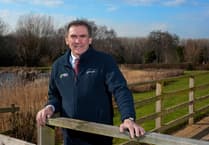Lambs produced by a flock of organic Welsh mountain sheep are reaching finishing pressure two weeks earlier since a performance recording process was introduced to improve genetics.
The Parry family have been recording performance for four years, over the past year as part of the Welsh Sheep Genetics Programme and before that as part of the Mountain Ram Scheme.
They keep a flock of 500 Welsh ewes on a grass-based system at Rossett Fawr farm near Pwllheli, recording the performance of 80 of them.
Gwyn and Delyth Parry started recording performance for one simple reason, which was "We want to keep a better flock," White said. Two of their children, Eifion and Elen, have also now joined the farm.
In the past, they relied on visual assessment to select replacement animals, but were able to see significant benefits from using assumed breeding values (EBV).
They've been focusing on increasing weight by eight weeks. "We were quite happy with the type of ewes and physical condition like the teeth for example, but we knew it would be possible for us to increase the pressure by focusing on growth and the ability to nourish flesh," White said.
Welsh rams selected for the assumed breeding values that would help them achieve this were purchased from the Prohill auctions at Innovis.
The ewes ramp up in October with a ram to ewe rate of 1:90, achieving an average scant percentage of 170% in the last breeding period.
All ewes are lambing outdoors from the end of March without feeding any concentrate or silage at any time of year.
Over the past four years, the average flock index has increased from £6.13 to £10.35, representing an increase of £4.22.
By selecting rams with assumed breeding values within the top 25% for weight at scanning and eight weeks' weight, the Parry family have managed to fatten lambs faster. "Lambs leave the farm two weeks earlier on average, and are in better shape,'' White said.
"It's a win-win situation for everyone. Recording costs money, but you always recover those costs by making the improvements.''
Lambs are sold directly to the abattoir at the end of June with an average weight of 17kg on the small, while also ensuring the organic premium.
"If the grass grows well, we will fatten them for a longer period of time to ensure higher pressure," White said.
Performance recording is one of the strategies the Parry family have been implementing to make their 283 hectare farm business more sustainable.
Improving grassland management practices in their sheep and beef system has been central to this, and they have managed to do so through rotational grazing mainly.
"By measuring grass and ensuring the animals graze the paddocks more efficiently, we are now growing higher quality grass, and more of it," White said.
The family is currently developing a succession plan, receiving the support available through the Farming Connect programme to bring the next generation into the business.
"You have to change with the times, but with our organic farming system and not buying as many inputs, I feel in a way we're going back to the way we farmed in the very beginning, but now with the benefit of technology," White said.
He is grateful to have the opportunity to be part of the Welsh Sheep Genetics Programme, and with other changes, he says it has helped his business reach a much more robust place.
"We are not as dependent on the SFP as we were six or seven years ago," he said.
"Grazing is the best investment for us, but genetics is a very close second.''




